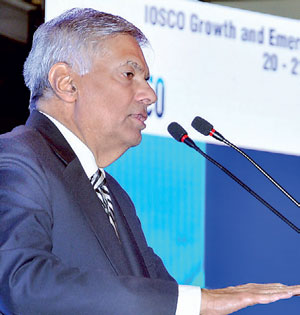Reply To:
Name - Reply Comment
By Chandeepa Wettasinghe
The government has resumed its efforts to restructure the Central Bank after months of silence on the matter, with Prime Minister Ranil Wickremesinghe announcing that discussions are ongoing to introduce a new monetary law.

“We’re now discussing a new monetary law, which will have the Central Bank focusing on essential items and not being involved in peripheral activities. That’s the first issue,” he said yesterday while delivering the keynote address at the International Organisation of Securities Commission’s (IOSCO) Growth and Emerging Markets Committee Annual Conference.
Past attempts at restructuring—started in 2016—were focused on clipping the Central Bank’s wings.
This generated an outpouring of support for the Central Bank from economists and other professionals late last year and early this year and Central Bank Governor Dr. Indrajit Coomaraswamy rode this wave of support this January to call for even greater powers to be bestowed upon his institution under collaborative reforms.
It is not yet clear whether the new monetary law Wickremesinghe spoke of is formulated collaboratively with the Central Bank. Attempts to reach several key Central Bank officials to gain confirmation were unsuccessful.
The past campaign to limit the Central Bank’s functions seemed to have lost its steam due to public opposition and the exit of the campaign’s main general—former Finance Minister Ravi Karunanayake.
Karunanayake too, similar to Wickremesinghe, had remained ambiguous on exactly which Central Bank functions would be removed from the monetary sector regulator.
Karunanayake built pressure against the Central Bank, by alleging that the Central Bank had been politicized under the past regime and that the officials appointed by the past government were sabotaging the economy under the current government.
Since politicians tend to focus on growth at the expense of macroeconomic stability, which the central bankers attempt to maintain through the independence of the monetary policy, a friction between politicians and central bankers is inevitable, unless the monetary authority is politicized.
Former Central Bank Deputy Governor W.A. Wijewardena, in his recently published book, articulates the dangers in politicizing the monetary policy to gain votes, which ultimately results in an erosion of price stability.
Despite Karunanayake’s allegations of the Central Bank being politicized, he was forced to resign as a minister for being linked to a case of alleged bond market rigging, which allegedly involves the then Central Bank Governor Arjuna Mahendran and his son-in-law. The case is currently under investigation.
Analysts opine, the way in which the Finance Ministry under Karunanayake tried to develop a national payment platform outside the purview of the Central Bank and Mahendran’s accommodative approach towards the government’s populist policies in 2015, endangering price stability, are a clear testament why the country’s Central Bank’s independence should be preserved.
Well respected economist Dr. Coomaraswamy was appointed in 2016 by President Maithripala Sirisena as Central Bank Governor despite Wickremesinghe’s efforts to keep Mahendran in office.
Dr. Coomaraswamy’s attempts to reintroduce independence and core functions at the Central Bank was rewarded by public name calling and verbal attacks by Karunanayake throughout this year.
Institute of Policy Studies Chairman Professor Razeen Sally had earlier this year said that Dr. Coomaraswamy had made good progress at the Central Bank and that some ruling party politicians were attempting to reverse such progress and reintroduce politicization.
Due to the provisions of the current monetary law, the treasury secretary still sits on the Monetary Board of the Central Bank, ensuring that the Central Bank does not have complete independence from the Finance Ministry.
Former State Bank of Pakistan Governor Ashraf Mahmood Wathra, during a visit to Sri Lanka last month, pointed out this weakness in Sri Lanka’s Central Bank in fulfilling its duties.
Meanwhile, Wickremesinghe yesterday said that a second piece of legislation would be introduced to create the previously proposed National Debt Office.
“Secondly, we will have the Liability Management Law and we will create a National Debt Office at the Finance Ministry,” he said.
The Central Bank has been supportive of this development, since debt management should not be a function of the Central Bank.
The prime minister said that a whole host of new laws would be introduced, so that the legislative environment pertaining to the economy would be completely different from what it is today.
“By 2018, the legal framework will change,” he said.
In addition to the already passed Foreign Exchange Act and the new Inland Revenue Act this year, he said that the new Securities and Exchange Commission Act and the law for the demutualization of the Colombo Stock Exchange have also been approved by the cabinet.
Further, a new import and export law will also be introduced.
“We are also at the moment running through a programme looking at encouraging the ease of doing business. It may be necessary for us to even bring in a law to deal with the ease of doing business,” Wickremesinghe added.